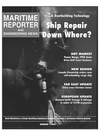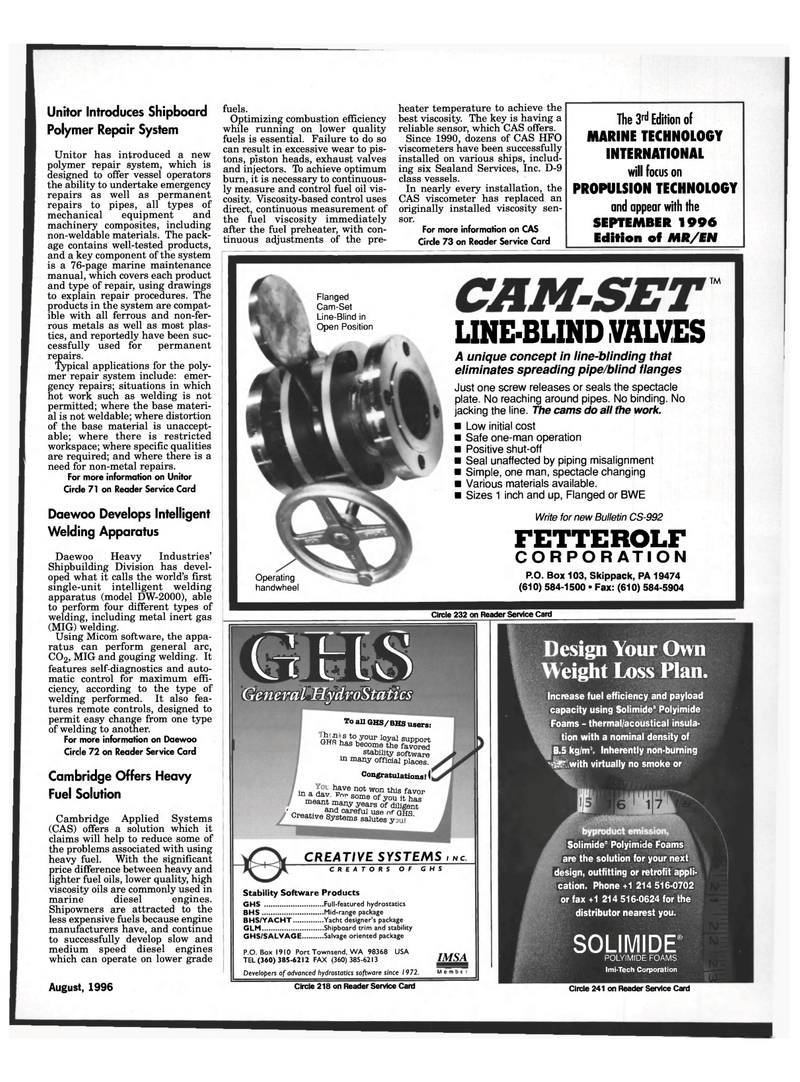
Page 31: of Maritime Reporter Magazine (August 1996)
Read this page in Pdf, Flash or Html5 edition of August 1996 Maritime Reporter Magazine
Unitor Introduces Shipboard
Polymer Repair System
Unitor has introduced a new polymer repair System, which is designed to offer vessel operators the ability to undertake emergency repairs as well as permanent repairs to pipes, all types of mechanical equipment and machinery composites, including non-weldable materials. The pack- age contains well-tested products, and a key component of the system is a 76-page marine maintenance manual, which covers each product and type of repair, using drawings to explain repair procedures. The products in the system are compat- ible with all ferrous and non-fer- rous metals as well as most plas- tics, and reportedly have been suc- cessfully used for permanent repairs.
Typical applications for the poly- mer repair system include: emer- gency repairs; situations in which hot work such as welding is not permitted; where the base materi- al is not weldable; where distortion of the base material is unaccept- able; where there is restricted workspace; where specific qualities are required; and where there is a need for non-metal repairs.
For more information on Unitor
Circle 71 on Reader Service Card
Daewoo Develops Intelligent
Welding Apparatus
Daewoo Heavy Industries'
Shipbuilding Division has devel- oped what it calls the world's first single-unit intelligent welding apparatus (model DW-2000), able to perform four different types of welding, including metal inert gas (MIG) welding.
Using Micom software, the appa- ratus can perform general arc,
C02, MIG and gouging welding. It features self-diagnostics and auto- matic control for maximum effi- ciency, according to the type of welding performed. It also fea- tures remote controls, designed to permit easy change from one type of welding to another.
For more information on Daewoo
Circle 72 on Reader Service Card
Cambridge Offers Heavy
Fuel Solution
Cambridge Applied Systems (CAS) offers a solution which it claims will help to reduce some of the problems associated with using heavy fuel. With the significant price difference between heavy and lighter fuel oils, lower quality, high viscosity oils are commonly used in marine diesel engines.
Shipowners are attracted to the less expensive fuels because engine manufacturers have, and continue to successfully develop slow and medium speed diesel engines which can operate on lower grade fuels.
Optimizing combustion efficiency while running on lower quality fuels is essential. Failure to do so can result in excessive wear to pis- tons, piston heads, exhaust valves and injectors. To achieve optimum burn, it is necessary to continuous- ly measure and control fuel oil vis- cosity. Viscosity-based control uses direct, continuous measurement of the fuel viscosity immediately after the fuel preheater, with con- tinuous adjustments of the pre- heater temperature to achieve the best viscosity. The key is having a reliable sensor, which CAS offers.
Since 1990, dozens of CAS HFO viscometers have been successfully installed on various ships, includ- ing six Sealand Services, Inc. D-9 class vessels.
In nearly every installation, the
CAS viscometer has replaced an originally installed viscosity sen- sor.
For more information on CAS
Circle 73 on Reader Service Card
The 3rd Edition of
MARINE TECHNOLOGY
INTERNATIONAL will focus on
PROPULSION TECHNOLOGY and appear with the
SEPTEMBER 1996
Edition of MR/EN
Flanged
Cam-Set
Line-Blind in
Open Position
TM
Operating handwheel
LINE-BLIND VALVES
A unique concept in line-blinding that eliminates spreading pipe/blind flanges
Just one screw releases or seals the spectacle plate. No reaching around pipes. No binding. No jacking the line. The cams do all the work. • Low initial cost • Safe one-man operation • Positive shut-off • Seal unaffected by piping misalignment • Simple, one man, spectacle changing • Various materials available. • Sizes 1 inch and up, Flanged or BWE
Write for new Bulletin CS-992
FETTEROLF
CORPORATION
P.O. Box 103, Skippack, PA 19474 (610) 584-1500 • Fax: (610) 584-5904
Circle 232 on Reader Service Card
GirLS
General HydroStatics
To all GHS/BHS users:
GhH?h^y°Ur l0^al support has become the favored stability software m many official places.
Congratulations! ( in a dav ^ DOt Won thls fav°r meantS°me 0f ^ jt has meant many years of diligent ' and careful use nf n&Q Creative Systems salutesy™3'
CREATIVE SYSTEMS I N C.
CREATORS OF GHS
Stability Software Products
GHS Full-featured hydrostatics
BHS Mid-range package
BHS/YACHT Yacht designer's package
GLM Shipboard trim and stability
GHS/SALVAGE Salvage oriented package
P.O. Box I9I0 Port Townsend, WA 98368 USA
TEL (360) 385-6212 FAX (360) 385-6213 IMSA esign Your Own eight Loss Plan.
Increase fuel efficiency and payload capacity using Solimide5 Polyimide
Foams - thermal/acoustical insula- tion with a nominal density of 8.5 kg/m3. Inherently non-burning lli with virtually no smoke or
Developers of advanced hydrostatics software since 1972. M e m b e
Solimide Polyimide Foams are the solution for your next design, outfitting or retrofit appli- cation. Phone +1 214 516-0702 or fax +1 214 516-0624 for the distributor nearest you.
SOLIMIDE®
POLYIMfDE FOAMS
Imi-Tech Corporation
August, 1996 Circle 218 on Reader Service Card Circle 241 on Reader Service Card

 30
30

 32
32
